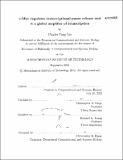| dc.contributor.advisor | Christopher B. Burge and Richard A. Young. | en_US |
| dc.contributor.author | Lin, Charles Yang | en_US |
| dc.contributor.other | Massachusetts Institute of Technology. Computational and Systems Biology Program. | en_US |
| dc.date.accessioned | 2013-03-13T15:46:20Z | |
| dc.date.available | 2013-03-13T15:46:20Z | |
| dc.date.copyright | 2012 | en_US |
| dc.date.issued | 2012 | en_US |
| dc.identifier.uri | http://hdl.handle.net/1721.1/77782 | |
| dc.description | Thesis (Ph. D.)--Massachusetts Institute of Technology, Computational and Systems Biology Program, 2012. | en_US |
| dc.description | Cataloged from PDF version of thesis. | en_US |
| dc.description | Includes bibliographical references (p. 203-226). | en_US |
| dc.description.abstract | Elevated expression of the c-Myc transcription factor occurs frequently in human cancers and is associated with tumor aggression and poor clinical outcome. However, the predominant mechanism by which c-Myc regulates global transcription in both healthy and tumor cells is poorly understood. In this thesis, I present evidence that c-Myc is a global regulator of RNA Polymerase II (RNA Pol II) transcriptional pause release. Transcriptional pausing occurs when additional regulatory steps are required to promote elongation of genes after transcription has initiated. Chapter 2 identifies transcriptional pausing as a general feature of transcription by RNA Pol II in mammalian cells. c-Myc is identified as having a major role in promoting release from pause at its target genes. Chapter 3 finds in tumor cells with elevated c-Myc, the transcription factor binds to promoters and enhancers of most actively transcribed genes. The predominant effect of c-Myc binding is to produce higher levels of transcription by promoting RNA Pol II transcriptional pause release. Thus, c-Myc accumulates in the promoter regions of active genes across the cancer cell genome and causes transcriptional amplification, producing increased levels of transcripts within the cells gene expression program. These results imply that transcriptional amplification can reduce rate-limiting constraints for tumor cell growth and proliferation. | en_US |
| dc.description.statementofresponsibility | by Charles Yang Lin. | en_US |
| dc.format.extent | 226 p. | en_US |
| dc.language.iso | eng | en_US |
| dc.publisher | Massachusetts Institute of Technology | en_US |
| dc.rights | M.I.T. theses are protected by
copyright. They may be viewed from this source for any purpose, but
reproduction or distribution in any format is prohibited without written
permission. See provided URL for inquiries about permission. | en_US |
| dc.rights.uri | http://dspace.mit.edu/handle/1721.1/7582 | en_US |
| dc.subject | Computational and Systems Biology Program. | en_US |
| dc.title | c-Myc regulates transcriptional pause release and is a global amplifier of transcription | en_US |
| dc.type | Thesis | en_US |
| dc.description.degree | Ph.D. | en_US |
| dc.contributor.department | Massachusetts Institute of Technology. Computational and Systems Biology Program | |
| dc.identifier.oclc | 827831535 | en_US |
